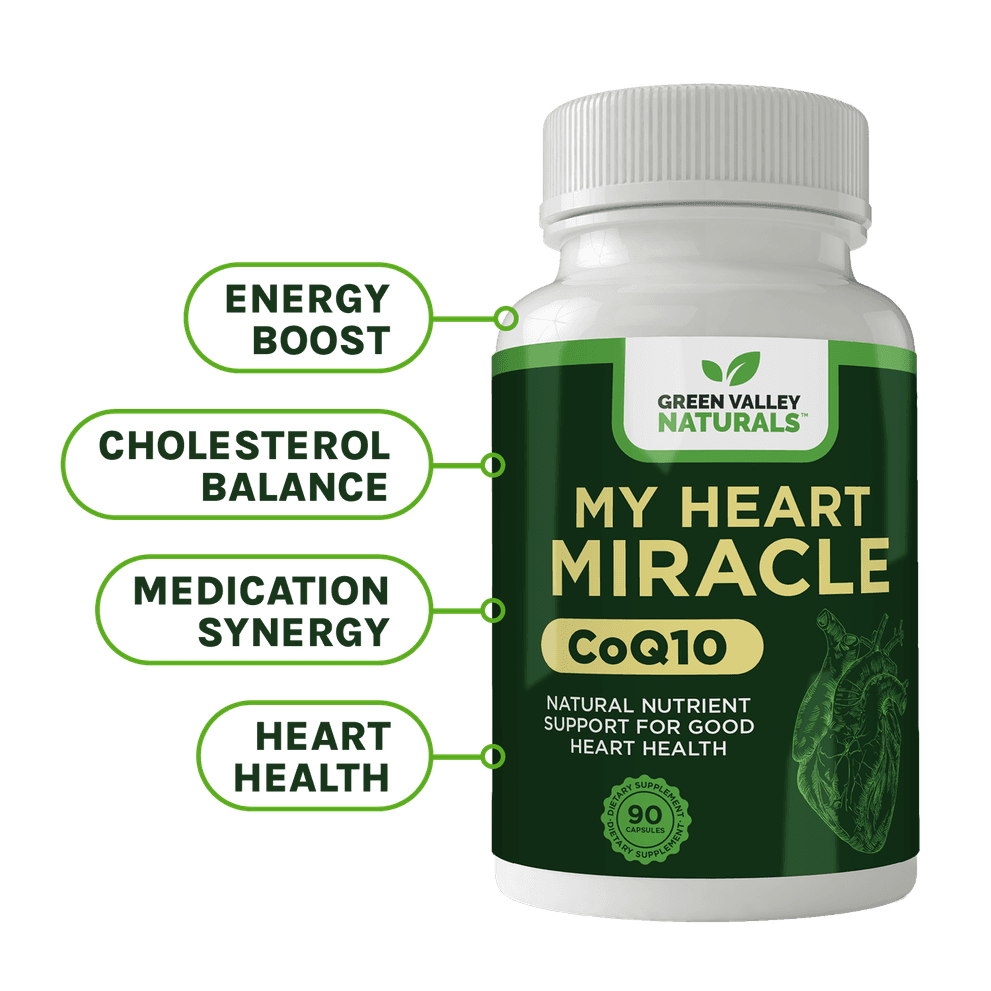
You already eat for your heart—but are you supplementing for it? A quiet shortfall in one essential mineral can affect circulation, energy, and even the body’s natural heart rhythm. The twist: this “miracle mineral” powers your heartbeat at the cellular level, yet low levels can go undetected for years. Ready to learn how much you may need, the best foods to get it from, and what labs and supplements actually help?
Key Takeaways
· Silent but serious: Chronic low magnesium often goes unnoticed, yet can affect blood vessel relaxation, rhythm regularity, and overall cardiovascular wellness.
· How it helps: Magnesium regulates cardiac rhythm and vascular tone, tempers inflammation/oxidative stress, and supports mitochondrial & DNA health.
· Close the gap: Prioritize magnesium-rich foods; consider a well-chosen supplement and testing with your clinician if deficiency is suspected.
Why Magnesium Matters So Much for Your Heart
Magnesium is a mineral your body uses for muscle function. Since your heart is essentially a giant muscle, it makes sense that not getting enough magnesium would impact this vital organ. And there’s plenty of research confirming exactly that.
Understanding exactly how magnesium protects your heart reveals just how essential this mineral truly is. In a comprehensive review of magnesium research from the last 20 years, published in the journal Nutrients in 2024, shows that magnesium keeps your heart healthy through multiple crucial mechanisms:
Mineral Balance and Heart Rhythm Magnesium regulates how your muscles use certain minerals—like calcium, potassium, and sodium—that are essential for keeping your heartbeat and blood pressure healthy. It acts as nature’s calcium channel blocker, controlling intracellular calcium mobilization and smooth muscle contraction. Magnesium also influences ion channels, including those for calcium, potassium, and sodium, which are critical for maintaining heart rhythm and vascular tone. This regulation is critical for helping maintain a steady heartbeat and healthy rhythm.
Fighting Inflammation and Oxidative Stress Magnesium lowers inflammation and oxidative stress, two of the key drivers behind poor overall cardiovascular health. By reducing inflammatory cytokine release and supporting endothelial function, magnesium helps maintain the health of your blood vessels. This protective effect extends throughout your entire cardiovascular system, helping blood vessels stay flexible and promoting overall cardiovascular wellness.
Metabolic Support Magnesium helps metabolize the unhealthy fats that lead to heart disease while also supporting healthy blood sugar levels. This metabolic regulation is particularly important for preventing the cascade of problems associated with metabolic syndrome—including abnormal lipid levels, unhealthy blood pressure balance, and insulin resistance. Magnesium acts as a cofactor in hundreds of enzymatic reactions involved in energy production and metabolic pathways essential for cardiovascular health.
Cellular Health and DNA Protection Other research published in 2024 found that low magnesium levels can increase DNA damage and impact mitochondrial health, leading to accelerated aging and disease. Both extracellular magnesium and intracellular magnesium play important roles in cardiac cell function and vascular health. This cellular-level damage affects not just your heart, but your entire body’s ability to function optimally and resist age-related decline.
What Happens When Magnesium Runs Low
In the 2024 Nutrients review scientists examined the link between magnesium deficiency and poor heart health outcomes. What they discovered should concern anyone interested in cardiovascular health.
According to the body of studies reviewed, magnesium deficiency was first linked to heart issues as early as 1932. However, it wasn’t until the 1970s that modern medicine began to recognize the profound impact this mineral could have on heart health outcomes. In the following decades, study after study revealed that magnesium deficiency can contribute to challenges with circulation, energy, and overall cardiovascular balance.
Cardiovascular disease remains a leading cause of death globally, and magnesium deficiency has been identified as a key modifiable risk factor. The World Health Organization recommends adequate magnesium intake to prevent cardiovascular disorders.
In fact, did you know that low magnesium levels can put you at risk for atrial fibrillation, one of the most common—and potentially dangerous—types of cardiac arrhythmia?
Low Magnesium and a Weak Heart Beat
Low magnesium can cause the upper chambers of your heart to beat irregularly, often leading to heart palpitations, fatigue, and shortness of breath. Magnesium supports stable electrical activity of your heart, helping to keep your heartbeat steady and strong.
When magnesium levels drop, this delicate electrical balance is disrupted, making it easier for a weak heart beat to develop. Numerous studies have shown that people with low magnesium intake or low magnesium levels are at higher risk. The good news? Both dietary magnesium intake and magnesium supplementation have been shown to help maintain a steady, natural heart rhythm.
But that's not all... research links low magnesium with challenges in circulation, blood vessel function, and overall cardiovascular performance. One reason is because low magnesium levels may lead to increased production of inflammatory cytokines, damaging your overall heart health.
So, it begs the question...
Magnesium Deficiency: Are You At Risk?
Most people have no idea whether they’re getting enough—or that a deficiency could be silently damaging their heart right now. Signs that might indicate magnesium deficiency include:
-
Heart palpitations or irregular heartbeat
-
Muscle cramps or twitches
-
Fatigue and weakness
-
Unhealthy blood pressure levels
-
Chronic stress
- Poor sleep quality
Warning: if you experience symptoms such as fainting, chest pain, or a severely elevated heart rate, it is important to seek immediate medical attention in the emergency room.
Several factors increase your risk of magnesium depletion, including kidney disease, diabetes, certain medications, and increased urinary excretion. Lower magnesium levels are commonly found in older adults and those who take:
-
Diuretics (especially loop and thiazide diuretics): furosemide, bumetanide, torsemide, ethacrynic acid, chlorothiazide
-
Proton Pump Inhibitors (PPIs): omeprazole (Prilosec), esomeprazole (Nexium), lansoprazole (Prevacid), pantoprazole (Protonix), rabeprazole (AcipHex)
-
Certain antibiotics: aminoglycosides (gentamicin, tobramycin, amikacin), amphotericin B, pentamidine
-
Antineoplastic drugs (chemotherapy agents): cisplatin, cetuximab
-
Calcineurin inhibitors: cyclosporine, tacrolimus
-
Cardiac glycosides: digoxin
-
Other medications: corticosteroids, oral contraceptives, hormone replacement therapy, some cholesterol-lowering agents, central nervous system stimulants
If you take any of these medicines, monitoring your magnesium levels becomes even more critical.
Getting Enough Magnesium: How Your Body Manages This Essential Mineral
But here’s the truly alarming part: magnesium deficiency can remain undetected for years while still taking a serious toll on your heart. This condition—called chronic latent magnesium deficiency—can lead to devastating heart issues without you ever knowing you’re at risk.
Measuring levels of magnesium is important for assessing risk, but standard tests may not always reflect true body stores.
The Truth About Blood Tests: Most routine blood tests measure serum magnesium, but this only reflects about 1% of your body’s total magnesium. The majority is stored in bones, muscles, and soft tissues, and it’s the intracellular magnesium that plays a key role in heart function and blood pressure regulation. You can have “normal” blood levels while still being functionally deficient. More comprehensive testing or assessment of risk factors and symptoms may be necessary.
That’s why it’s important to focus not just on magnesium intake, but also on the factors that affect how your body manages this essential mineral.
Magnesium homeostasis is a fancy term for the body’s finely tuned system for keeping magnesium levels in balance—a process that’s absolutely vital for heart health and the prevention of cardiovascular diseases. Your body relies on a network involving the kidneys, intestines, and various hormones to regulate magnesium. The kidneys are the major regulator, adjusting how much magnesium is excreted in the urine based on your body’s needs. When dietary magnesium intake is low or when there’s increased urinary excretion—such as from certain medications or health conditions—magnesium deficiency can develop.
About half of the magnesium you consume from dietary magnesium is absorbed in the intestines, while the rest is eliminated in the feces. However, factors like impaired intestinal absorption or chronic illnesses can disrupt this balance, leading to low magnesium levels.
So if you suspect your magnesium is low, ask your doctor to check your blood levels at your next appointment. Doing so may save your heart.
In the meantime, you can take action by increasing your dietary magnesium intake.
The Delicious Way to Get More Magnesium
I don’t know about you, but I love being able to eat my way to better health. And if you want to consume more magnesium, you’ll be really happy about what’s on the menu. Low magnesium levels are commonly found in individuals who do not consume enough magnesium-rich foods, making it important to pay attention to your diet.
Dietary magnesium intake is crucial for maintaining healthy magnesium levels, and fortunately, many delicious foods are excellent magnesium sources. Meeting recommended magnesium intakes is essential for optimal heart health and reducing the risk of cardiovascular disease:
Nuts and Seeds:
-
Almonds (80 mg per ounce)
-
Cashews (75 mg per ounce)
-
Peanuts (50 mg per ounce)
-
Chia seeds (95 mg per ounce)
Legumes and Grains:
-
Beans (black beans: 60 mg per half cup)
-
Quinoa (118 mg per cup, cooked)
Fruits and Vegetables:
-
Avocado (58 mg per medium avocado)
-
Bananas (32 mg per medium banana)
-
Spinach (157 mg per cup, cooked)
-
Potatoes (43 mg per medium potato with skin)
Other Sources:
-
Yogurt (42 mg per cup)
- Dark chocolate (64 mg per ounce of 70-85% cacao)
- Electrolyte powders and drinks
Individual magnesium needs may vary based on age, lifestyle, and health status, so it’s important to consider your personal situation when planning your diet.
You could make one heck of a heart-healthy snack plate with all these delicious foods! Dark leafy greens, in particular, are magnesium powerhouses that also provide additional cardiovascular benefits through their fiber, potassium, and antioxidant content.
Understanding your magnesium requirements is key to ensuring adequate intake and supporting cardiovascular health.
Magnesium Supplementation: What You Need to Know
Magnesium supplements can be a useful way to support healthy magnesium levels when diet alone isn’t sufficient. However, supplementation requires careful consideration.
Dosage Guidelines: The estimated average requirement for magnesium is:
-
420 mg per day for men
-
320 mg per day for women
However, individual needs may vary based on age, health conditions, and medications.
Types of Magnesium: Not all magnesium supplements are created equal. Common forms include:
-
Magnesium citrate: Well-absorbed and commonly recommended
-
Magnesium glycinate: Gentle on the stomach, less likely to cause digestive issues
-
Magnesium oxide: Less expensive but poorly absorbed
-
Magnesium chloride: Good absorption, often used in topical applications
Important Considerations: Magnesium supplements can interact with certain medications, including:
-
Blood pressure medications
-
Antibiotics
-
Bisphosphonates (osteoporosis drugs)
-
Diuretics
-
Proton pump inhibitors
Excessive intake can lead to adverse effects, including diarrhea, nausea, and in severe cases, cardiac complications. Be sure to check with your doctor for the correct dosage and type for you, especially if you have kidney disease or take medications regularly.
Interactions with Medications: What Your Doctor Might Not Tell You
Magnesium is a team player in your body, but it doesn’t always get along with every medication. Certain drugs can interfere with how your body absorbs or excretes magnesium, which can impact your magnesium levels and, in turn, your heart health. For example, diuretics—often prescribed for unhealthy blood pressure or weakened heart function—can lead to increased urinary excretion of magnesium, raising your risk of deficiency. Proton pump inhibitors, commonly used for acid reflux, can decrease magnesium absorption in the gut.
Blood thinners, such as warfarin, may also interact with magnesium supplements, potentially increasing the risk of bleeding. If you have kidney disease or weakened heart function, you need to be especially cautious: your body may not be able to handle extra magnesium, making you more susceptible to magnesium toxicity.
That’s why it’s essential to keep your healthcare provider in the loop about any magnesium supplements or medications you’re taking. They can help you navigate potential interactions and ensure you’re getting the right amount of magnesium for your unique needs—without putting your health at risk.
Side Effects of Magnesium Supplements: What to Watch Out For
While magnesium supplements can be a great way to boost your magnesium intake, especially if you’re not getting enough from your diet, they’re not without their side effects. The most common issues—especially with higher doses—are digestive, including diarrhea, nausea, stomach cramps, and bloating. These symptoms are your body’s way of telling you it’s getting too much magnesium at once.
In rare cases, taking too much magnesium can lead to more serious problems, such as muscle weakness, fatigue, or even respiratory depression. This is especially true for people with kidney disease or those taking certain medications. Magnesium supplements can also interact with other drugs, so it’s important to be cautious.
To minimize side effects, start with a low dose of your magnesium supplement and increase gradually if needed. Always choose a high-quality product, and talk to your healthcare provider before starting any new supplement—especially if you have underlying health conditions or take other medications. Listening to your body and seeking professional advice can help you enjoy the benefits of magnesium without the unwanted surprises.
The Public Health Imperative
Magnesium deficiency represents a significant public health concern that deserves greater awareness. The cardiovascular burden of inadequate magnesium intake extends beyond individual health—it impacts healthcare systems and communities worldwide.
Risk stratification and regular monitoring of magnesium levels can help identify individuals at risk of deficiency before serious cardiovascular events occur. Greater awareness of the importance of magnesium in maintaining heart health can help prevent cardiovascular diseases and reduce unnecessary suffering.
Public health initiatives that promote magnesium-rich dietary habits and appropriate supplementation could have far-reaching effects on cardiovascular disease prevention. This is particularly important for high-risk populations, including older adults, people with diabetes or kidney disease, and those taking medications that deplete magnesium.
Clinical Implications: What This Means for You and Your Healthcare Team
The connection between magnesium and cardiovascular health isn’t just interesting science—it has real-world implications for you and your healthcare team. Magnesium deficiency is now recognized as a significant risk factor for cardiovascular diseases, including weakened heart function, irregular heart rhythm, and unhealthy blood pressure. If you have low magnesium levels, you may benefit from magnesium supplementation or simple changes to increase your magnesium intake through magnesium rich foods.
Healthcare professionals should routinely consider magnesium status when evaluating patients with cardiovascular disorders or risk factors like unhealthy blood pressure and weakened heart function. Monitoring magnesium levels, assessing dietary habits, and being aware of potential interactions with medications can all help prevent complications related to low magnesium.
For patients, this means being proactive: ask about your magnesium levels, discuss dietary magnesium intake, and don’t hesitate to bring up magnesium supplementation if you have concerns. For healthcare providers, incorporating magnesium assessment and management into routine care can make a significant difference in cardiovascular outcomes.
On a broader scale, public health initiatives that promote magnesium-rich diets and awareness of magnesium’s role in heart health can help prevent magnesium deficiency and reduce the burden of cardiovascular diseases. Whether you’re a patient or a provider, understanding the role of magnesium in cardiovascular health is a powerful tool for preventing disease and supporting a healthy heart.
Your Action Plan for Better Heart Health
Magnesium is an essential mineral that plays a vital role in maintaining heart health and preventing cardiovascular diseases. The impact of magnesium on the cardiovascular system is well-established, and it should be considered a key factor in your overall heart health strategy.
Here's your action plan:
-
Get Tested: Ask your doctor to check your magnesium levels at your next appointment, especially if you have risk factors for deficiency.
-
Improve Your Diet: Incorporate more magnesium-rich foods into your daily meals. Aim for a variety of sources—nuts, seeds, leafy greens, legumes, and yes, even dark chocolate.
-
Consider Supplementation: If dietary intake isn't sufficient or you have increased needs, discuss appropriate supplementation with your healthcare provider.
-
Monitor Your Heart Health: Pay attention to signs that might indicate magnesium deficiency, including heart palpitations, muscle cramps, or unexplained fatigue.
-
Address Risk Factors: If you have conditions that increase magnesium depletion (kidney disease, diabetes, chronic stress), work with your doctor to ensure adequate intake and monitoring.
Adequate dietary magnesium intake combined with appropriate supplementation when necessary can help maintain healthy magnesium levels that support circulation, cellular energy, and overall well-being as you age. This simple mineral may be one of the most important—and most overlooked—factors in maintaining a strong, healthy heart as you age.
Summary
Magnesium is a foundational electrolyte for heart and vascular health. A growing body of research links low or “chronic latent” magnesium deficiency with heart issues—often without obvious early symptoms. Magnesium supports healthy electrical conduction and muscle relaxation in the heart, balances calcium/potassium/sodium flux, reduces oxidative stress and inflammation, and assists lipid metabolism and mitochondrial/DNA integrity. Diet can meaningfully raise intake (nuts, seeds, legumes, leafy greens, yogurt, dark chocolate, etc.), and targeted supplementation—when appropriate—can help close gaps. Ask your provider about checking magnesium status and which form/dose fits your health goals and medications.
Nielsen, F. H. (2024). The Role of Dietary Magnesium in Cardiovascular Disease. Nutrients, 16(23), 4223. https://doi.org/10.3390/nu16234223
Dhillon, V.S., Deo, P. & Fenech, M. (2024). Low magnesium in conjunction with high homocysteine increases DNA damage in healthy middle aged Australians. European Journal of Nutrition, 63, 2555–2565.
Liu, R., et al. (2025). Association of magnesium depletion score with all-cause and cardiovascular disease mortality among US adults. Journal of Trace Elements in Medicine and Biology, 75, 127019.
https://www.sciencedirect.com/science/article/abs/pii/S0946672X25001749
Schmidt, B., et al. (2025). The NAKO-MRI Study With Mendelian Randomization: Magnesium and Subclinical Cardiac Changes in a Population-Based Cohort. Journal of Clinical Endocrinology & Metabolism. https://academic.oup.com/jcem/advance-article-abstract/doi/10.1210/clinem/dgaf476/8239413?redirectedFrom=fulltext
Li, S., et al. (2025). Hypomagnesemia: exploring its multifaceted health impacts and therapeutic implications. Biological Trace Element Research, 199, 683–697.
https://pmc.ncbi.nlm.nih.gov/articles/PMC12168336/
Sun, J., et al. (2025). Association of magnesium depletion score with increased stroke risk: The NHANES study. Scientific Reports, 15, 91227. https://pubmed.ncbi.nlm.nih.gov/40000741/
Wang, C., et al. (2025). Association between magnesium depletion score and atherosclerotic cardiovascular disease: Evidence from a national survey. Frontiers in Cardiovascular Medicine, 12, 12367052.
https://pmc.ncbi.nlm.nih.gov/articles/PMC12367052/
My Heart Miracle
Scientifically proven to help increase energy at the cellular level while actually boosting the cholesterol-fighting effects of your medication



